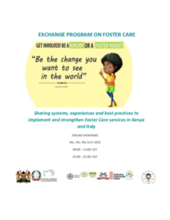This panel discussed coronavirus-associated caregiver loss and the work being done by the international community, the U.S. government, and faith-based actors to support vulnerable children and turn the tide toward better care. It was moderated by Gillian Huebner, executive director of the Georgetown University Collaborative on Global Children’s Issues.
This webinar, the sixth in the Transforming Children's Care Webinar Series, provided an introduction to trauma-informed care from various perspectives and vantage points.
This video by the Alliance for for Child Protection in Humanitarian Action details
Not About Me is a feature documentary about good intentions and unintended consequences. When Morgan Wienberg, a well-meaning Canadian teenager, volunteers at a Haitian orphanage in the aftermath of the 2010 earthquake, her plans take a turn. She is part of an army of NGOs and volunteers with billions in promised aid, all rushing to respond to the disaster. But once on the ground, she begins to see their earnest actions have their own devastating impacts.

This webinar, the fifth in the Transforming Children's Care Webinar Series focused on a new study ('Impact of COVID-19 on Privately Run Residential Care Institutions: Insights and Implications for Advocacy and Awareness Raising'). The study, comprising 21 semi-structured interviews across seven focus countries, explores the effect of COVID-19 on a small number of privately run and funded residential care institutions.
The Kenya-Italy “Virtual Exchange Program on Foster Care” aims to create a platform for learning, networking and sharing knowledge and best practices on Foster Care among different government stakeholders, from Kenya and Italy.
The exchange program took place on 5th, 7th and 9th July 2021.
In this video from the Guardian, Leyland Cecco explains how the discovery of more than 1,000 unmarked graves on the grounds of former church-run residential schools in Canada is just the tip of the iceberg in uncovering Canada's traumatic colonial past.
This webinar, the fourth in a series from the Transforming Children's Care Global Collaborative Platform, explored the importance of protecting the child’s right to identity in how it is created, how it may be modified and/or falsified in alternative care as well as the need to preserve information about the child’s identity, notably family relations.
Accurate and reliable data on children living in residential care institutions are essential. However, these children are not identified through household surveys and, as a result, are not typically included in official national statistics on key indicators of child well-being. This includes indicators that comprise global monitoring frameworks, such as the Sustainable Development Goals. To help address this data gap, UNICEF has developed the first-ever comprehensive package to collect data on children living in residential care settings. Claudia Cappa, Senior Adviser for Statistics and Monitoring, Data and Analytics Section, DAPM/UNICEF HQ, explains more.

